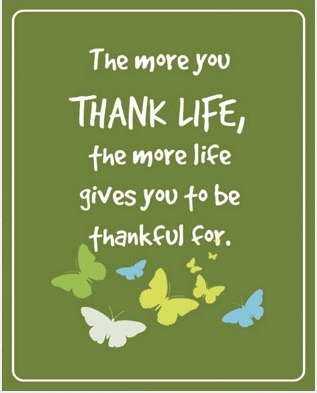Living In Gratitude: 5 Myths About Being Grateful
Does gratitude make us lazy? Naive?
Robert Emmons, the world’s leading scientific expert on gratitude, debunks five of the most common myths and misconceptions about being grateful.
1. Gratitude leads to complacency
If we are grateful, will we be motivated to challenge the status quo or improve our lot in life?
In reality, studies suggest that the opposite is true: Gratitude drives a sense of purpose and a desire to do more.
People are actually more successful at reaching their goals when they consciously practice gratitude. Among a group of study participants, the grateful group tasked to keep a gratitude journal made 20 percent more progress toward their goals than the non-grateful group and they continue to strive harder toward their goals.
2. Gratitude is a naïve form of thinking
Some believe gratitude is simply about thinking nice thoughts and expecting good things while ignoring the negativity, pain, and suffering in life.
When people are grateful, they aren’t necessarily free of negative emotions. Studies have found that practicing gratitude magnifies positive feelings more than it reduces negative feelings. It enables us to see the blessings during hard times, bolstering our resilience.
3. Gratitude makes us too self-effacing
When we recognize the ways others have helped us, does that mean we risk overlooking our own hard work or natural abilities?
Research suggests that gratitude is actually associated with a greater sense of personal control over one’s success.
Grateful people give credit to others, but not at the expense of acknowledging their own responsibility for their success. It’s not an either/or situation: either I did this all myself or somebody else did it for me. Rather, they recognize their own feats and abilities while also feeling gratitude toward the people who helped and supported them along the way.

4. Gratitude isn’t possible or appropriate in the midst of adversity or suffering
When life is going well, of course we can be grateful. But what about when we are facing adversity?
Science suggests we can cultivate or maintain an attitude of gratitude through hard times, and that we’ll be better for it.
Gratitude is both possible and vital to helping us get through tough times. When faced with adversity, gratitude helps us see the big picture and not feel overwhelmed by the setbacks we’re facing in the moment. Studies show that expressing gratitude during life’s major challenges helps us maintain our overall well-being, find closure and experience less negative emotions.
5. We have to be religious to be grateful
While some research suggests those who are religious may be more inclined to practice gratitude, it is by no means a precursor to being grateful. And of those who are grateful, they very often give credit for their abundance to other people, genetics and hard work.
The new science of gratitude has demonstrated that anyone can have a grateful disposition. Gratitude is powerful and transforming. It can help us strive for and reach our goals, boost our resilience, magnifies our optimism and enables us to appreciate all that others have done for us as well as be grateful for our own talents and abilities.

You can purchase this print in our Gratitude Gift Shop.







